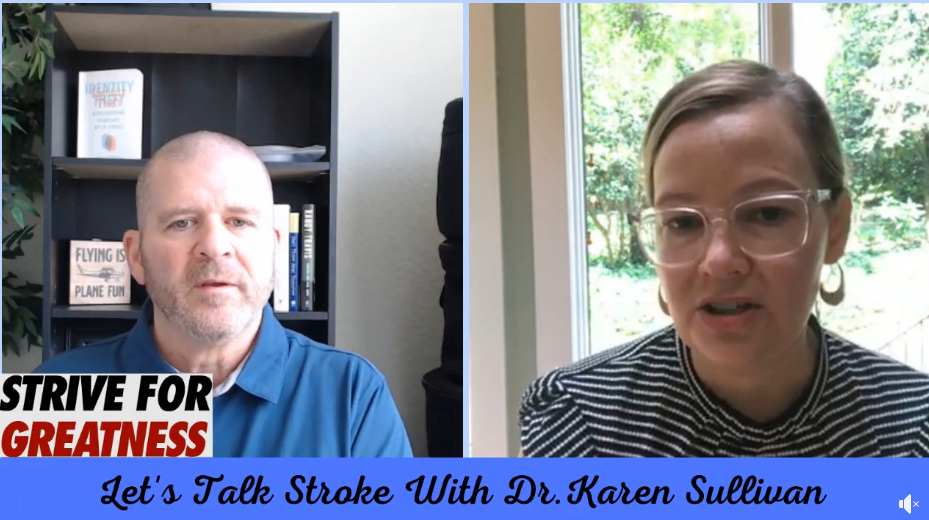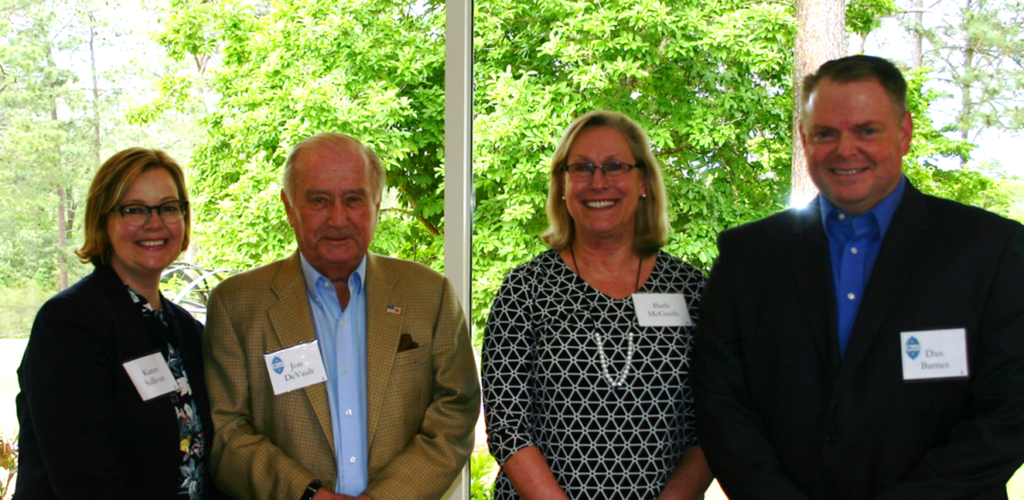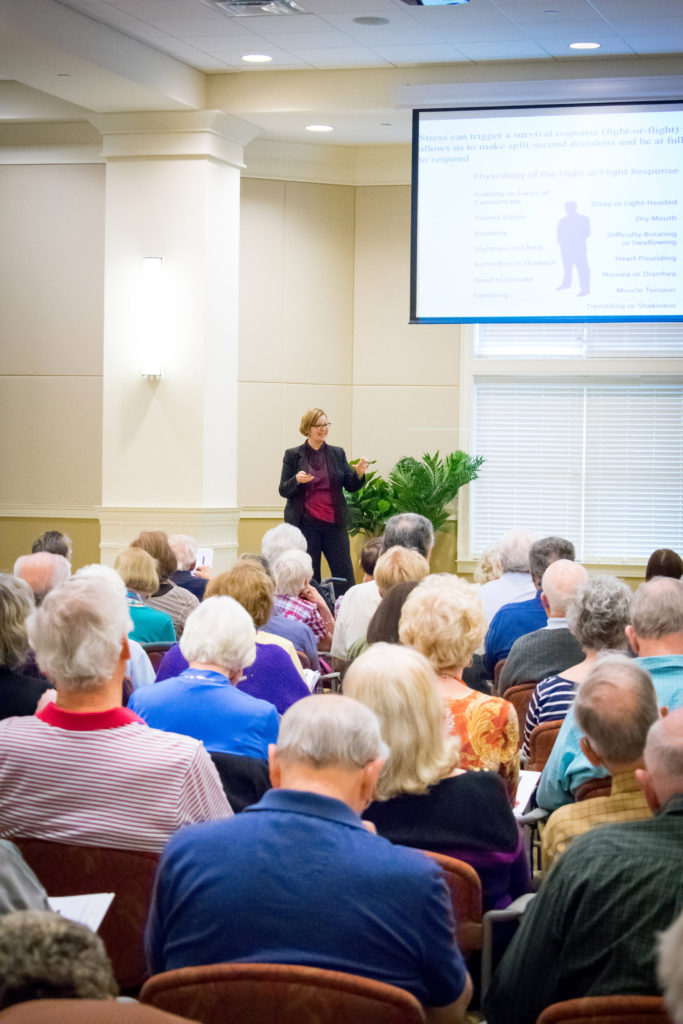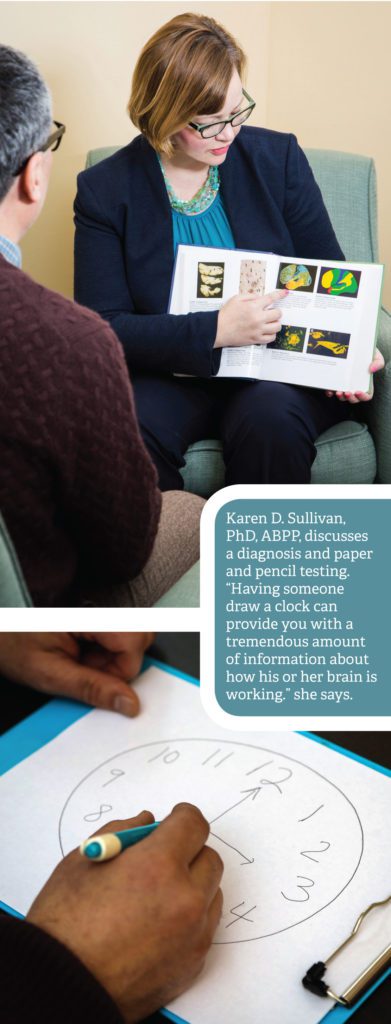SHOWS & PODCASTS featuring Dr. Sullivan
Strive For Greatness-Let’s Talk Stroke with Jerry Wald

Strokecast Episode 081 Neuropsychology with Dr. Karen Sullivan
Healing the Brain with Jane No-Brainer Podcast:
Episode 8: Dr. Karen Sullivan founder of I CARE FOR YOUR BRAIN
THE NEURONERDS: I Care For Your Brain: Stroke Awareness with Dr. Sullivan

Community Partners Join Forces for Stroke Awareness and Recovery
PINEHURST, NC, MAY 23, 2019 “In recognition of National Stroke Awareness in May, The Foundation of FirstHealth and Neuropsychologist Karen D. Sullivan, PhD, ABPP, are partnering to provide patients discharged from FirstHealth Moore Regional Hospital’s Stroke Center with an Interactive Stroke Recovery Guide. The guide, the latest addition to the I CARE FOR YOUR BRAIN with Dr. Sullivan program, offers insights from neuroscience and positive psychology to help empower stroke survivors and their families with information to achieve the best recovery possible.
After evaluating hundreds of people after a stroke in my practice, I was asked again and again to recommend a comprehensive recovery guide,†says Sullivan, owner of Pinehurst Neuropsychology. When I couldn’t find one that I loved, I set out to create a guide that gives people three things: comprehensive science-based information, motivational strategies to apply that knowledge to their unique stroke circumstance, and the tools to monitor and track their recovery progress after leaving the hospital.
Sullivan approached the Foundation of FirstHealth with the idea of printing the guide for distribution to patients and was quickly informed that a special CARE Fund for Neurosciences was established years ago by Marjorie and John Roffe. CARE, an acronym for Clinical, Advocacy, Resources and Education, was founded with goals of promoting prevention through education and supporting advocacy programs in the community.
“Dr. Sullivan’s guide was an excellent illustration of the CARE Fund’s purpose,” says Kathy Stockham, president of The Foundation of FirstHealth. “Patients and their families can now leave the Stroke Center with a comprehensive educational and self-empowerment tool to make sure they have the best ingredients for the most successful outcome. The Foundation of FirstHealth is committed to making a genuine difference in the quality of life for those living in our community and we know this guide will help us achieve that goal.”
Since receiving its certification as a Primary Stroke Center in 2015, the FirstHealth Stroke Center also most recently received the American Heart Association/American Stroke Association’s Get With The Guidelines Stroke Gold Plus Quality Achievement Award, which acknowledges the hospital’s commitment to ensuring stroke patients receive the most appropriate treatment according to nationally recognized, research-based guidelines based on the latest scientific evidence.
During a patient’s stay in the Stroke Center, care objectives, delivered by neuro hospitalists Melanie Blacker, MD, Sarah Uffindell, MD, and Steven Lewis, MD, stroke coordinator Barbara McGrath, RN, and a skilled team of neuro-nurses, include medical stabilization, identifying the cause or causes of the stroke and reducing disability.
“The continuum of care for the patient experiencing a stroke requires a multidisciplinary, patient centered approach to achieve optimal outcomes,” Dr. Blacker says. This continuum begins in the pre-hospital setting with rapid symptom recognition and EMS dispatch and transport, rapidly and comprehensively assessing for acute treatment options, and throughout the acute inpatient setting.
Studies have shown that the transition from the acute inpatient setting to in- and outpatient rehabilitation or long-term care environments has consistently been identified as an obstacle to quality stroke rehabilitation. We must continue to approach this post inpatient transition as part of the continuum of care and provide patients with both educational tools, such as Dr. Sullivan’s stroke guide, as well psychosocial support. This phase of recovery is crucial to optimizing patient outcomes and recovery.”
Providing the guide to patients transitioning to the 15-bed Inpatient Rehabilitation Center at FirstHealth, other local rehabilitation facilities or returning home with the support of family, friends and outpatient care is one more impactful way the Stroke Center team can aid in the recovery process.
“Dr. Sullivan is a huge advocate for brain health, and this guide demonstrates the important role that post-care support, education and advanced rehab strategies have in improving the stroke patient’s outcome,” McGrath says. “She brings great value to our stroke program, and we are fortunate to have her practicing in our community.”
North Carolina is one of nine states in the Southeast that comprise the Stroke Belt and ranks sixth in the nation for stroke-related deaths. With up to 80 percent of strokes considered to be preventable with behavior changes—controlling high blood pressure and diabetes, taking your medications exactly as prescribed, losing weight and quitting smoking, this group effort between The Foundation of FirstHealth, Moore Regional Stroke Center and Sullivan to provide community education and resources aims to be part of a greater solution. Plans for future care collaboration include a community outreach event this fall to further raise stroke awareness.
“It is so rewarding to finally get this Interactive Stroke Recovery Guide to those who will benefit the most, and to do it hand-in-hand with the amazing FirstHealth Stroke Center team and the support of The Foundation of FirstHealth makes me feel extremely positive about the future of brain health care in the Sandhills,” Sullivan says. “It’s pretty simple, really, people get better when community partners join forces.”
For more information on I CARE FOR YOUR BRAIN with Dr. Sullivan program, visit www.icfyb.com or call 910-420-8041. For more information on FirstHealth’s services, including stroke care, visit www.firsthealth.org or call 800-213-3284
DURHAM, NC, JANUARY 5, 2018 The Forest at Duke, a vibrant continuing care retirement community located in the heart of Durham, is proud to be hosting “I Care For Your Brain with Dr. Sullivanâ€, an award-winning brain health program beginning in January of 2018. The program is centered on nine brain-centric topics that science has shown to contribute to successful aging.“We are committed to providing our residents with a life of the highest quality; we believe in providing enriching programming that makes a significant contribution to our residents’entire well-being, including their family.†– Anita Holt, President/CEO The Forest at Duke.
In a recent survey of 1,037 older Americans, memory loss was cited as their No. 1 fear, more so than the fear of being buried alive, snakes or a terrorist attack. The American Psychological Association predicts that dementia-related anxiety is on the rise and could become its own clinical disorder. These facts inspired neuropsychologist Karen D. Sullivan, PhD, ABPP, to create the I Care For Your Brain with Dr. Sullivan program.
Recognizing the impact of the program, LeadingAge North Carolina, a Raleigh-based nonprofit representing 69 senior living communities presented its Excellence in Collaboration award to the “I Care For Your Brain program in May 2017.
Sullivan completed her formal education and training at Boston University, Harvard Medical School and assistant professorship at the University of North Carolina at Chapel Hill’s School of Medicine. She draws from her personal experiences as a caregiver, nursing assistant, therapeutic companion, activities director and co-director of an adult day health program.
For more information about the program and to inquire about registration, visit: www.forestduke.org/events
Pinehurst Neuropsychologist Launches Second Year of Award-Winning Brain Health Program For Older Adults
 SEPTEMBER 12, 2017 “In a recent survey of 1,037 older Americans, memory loss was cited as their No. 1 fear, more so than the fear of being buried alive, snakes or a terrorist attack. The American Psychological Association predicts that dementia-related anxiety is on the rise and could become its own clinical disorder.
SEPTEMBER 12, 2017 “In a recent survey of 1,037 older Americans, memory loss was cited as their No. 1 fear, more so than the fear of being buried alive, snakes or a terrorist attack. The American Psychological Association predicts that dementia-related anxiety is on the rise and could become its own clinical disorder.
These fears have created a ripe opportunity for marketers, and brain scientists warn that an epidemic of exploitation is dominating the field. In 2014, 74 psychologists and neuroscientists from around the world wrote an open letter to companies marketing brain products,stating they are “exploiting customers by making exaggerated and misleading claims that are not based on sound scientific evidence.”
These facts inspired Pinehurst neuropsychologist Karen D. Sullivan, PhD, ABPP, to create the I Care For Your Brain with Dr. Sullivan program.
“I have serious concerns about the so-called “brain fitness”industry, including supplements, computer games and phone apps that promise to enhance brain functioning and, even, prevent or reverse brain diseases, like dementia,” Sullivan says. “It is well known in scientific circles that there is very little to no proof that these products do anything except empty the wallets of older adults to the tune of 8-10 billion dollars annually. I knew I had a responsibility to offer something better. My goal was to develop a brain health program that was entirely based in science and motivates older adults to make the genuinely impactful changes that, according to scientists not marketing executives, really improve brain health.”
After two years of development, Sullivan launched the I Care For Your Brain program last October at Penick Village, a life plan retirement community in Southern Pines. To date, more than 1,600 people attended the monthly lecture series.
“The program is centered on nine brain-centric topics that science has shown to contribute to successful aging,” Sullivan says, “The lectures are delivered in two parts, beginning with high-quality scientific information on a topic and concluding with evidence-based recommendations that participants can begin implementing immediately. My goal is to empower older adults with practical and achievable instruction that truly improves their brain health at little or no cost.”
There are more than 100 scientific journals dedicated to brain health, and until now, the main way the public learned about all of the incredible information contained in these pages was in sensationalized media snippets, emphasizing shock value or to sell a product. I wanted to close this gap and give older adults the objective, science-based information needed to truly attain brain health.”
Recognizing the impact of the program, LeadingAge North Carolina, a Raleigh-based nonprofit representing 69 senior living communities, including Penick Village, presented its Excellence in Collaboration award to the I Care For Your Brain program in May.
“Dr. Sullivan’s program is delivered in an easy-to-understand style that is purposefully designed to motivate for action,” says Jeff Hutchins, Penick Village CEO. “The program empowers older adults with unbiased, scientifically vetted information about brain health, independence and living a life of quality. This is the type of advocacy in action that will revolutionize the aging industry, and we are thrilled to have partnered with Dr. Sullivan to offer this program. Our residents have absolutely loved it, and we’ve never had a more consistently well-attended event in our history.”
Prior to opening her neuropsychology practice in Pinehurst, Sullivan completed her formal education and training at Boston University, Harvard Medical School and assistant professorship at the University of North Carolina at Chapel Hill’s School of Medicine. She draws from her personal experiences as a caregiver, nursing assistant, therapeutic companion, activities director and co-director of an adult day health program.
“I am determined to provide older adults with the information they need to become more informed consumers of brain science and empowered participants in this important aspect of their health,” Sullivan adds. “I began my career in residential communities and am proud to provide a bridge from the academic back to the real world.”
The second year of the I Care For Your Brain program lectures resume at Penick Village on Oct. 31, presented monthly through June 2018. The in-person lectures also begin at Forest at Duke, a continuing care retirement community in Durham, in January 2018.
“Dr. Sullivan has done an amazing job of bringing important brain issues to the forefront,” says Margaret Sherrod, a program participant. “She explained the topics in a very clear and interesting manner, things no one talks about, always with a little humor and, most importantly, a great deal of knowledge. I’ve gotten so much out of it. It’s made a big difference in my life.”
Due to its popularity to date, Sullivan is also offering the I Care For Your Brain†program in a new online format through www.ICFYB.com.
“It became clear after just a few in-person lectures that I needed to expand to an online version of the program,” Sullivan says. “The interest level has been so strong, we literally don’thave enough seats for everyone who wants to attend. It’s been very satisfying to see my vision for bringing high-quality, scientific information about brain health a reality.”
Brain & Behavior: The Science of Neuropsychology
 Published OutreachNC Magazine March 2017 by Carrie Frye | Photography by Diana Matthews
Published OutreachNC Magazine March 2017 by Carrie Frye | Photography by Diana Matthews
Solving a Sudoku puzzle, taking a brisk walk or eating more broccoli might be typical topics of conversation when it comes to better brain health. The subject is much more top of mind these days, and perhaps should be with more than 5 million Americans living with Alzheimer’s disease.
Keeping busy with an engaged mind and staying connected socially are two key factors identified in a 2015 Harvard Medical School study to help stave off dementia, and a recent AARP study cites mental sharpness as a top priority for those 50 and older, even outranking concerns over Social Security and physical health. Baby boomers may be the driving force due to an increased aging population but just as prevalent is their desire for more proactive health initiatives and answers when cognitive changes in function and behavior begin affecting everyday life.
“On the whole, older adults are becoming more aware of the importance of brain health,” says Karen D. Sullivan, PhD, ABPP and owner of Pinehurst Neuropsychology Brain and Memory Clinic. “They are actively seeking to learn and employ scientifically supported strategies to improve brain health, reduce the risk of developing dementia and detect memory loss at the earliest stage possible.”
Chris Contardo, PhD, ABPP at Psychiatric and Psychological Specialties in St. Joseph, Michigan, serving patients throughout southwest Michigan, also recognizes a move toward clear diagnoses by boomers as a national trend.
“If there has been a push, it is the early identification of memory loss,” he says. “It really comes down to people moving away from screenings and not being OK with whatever is happening to them. Boomers are demanding research continue to enable the latest technological developments and using neuropsychology in a proactive way to help identify potential problems before a crisis, such as knowing someone should not drive before there is an accident.” Click Here to Read More

